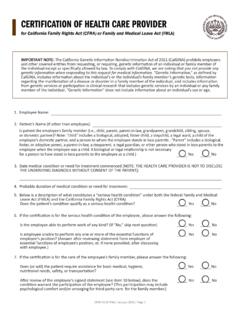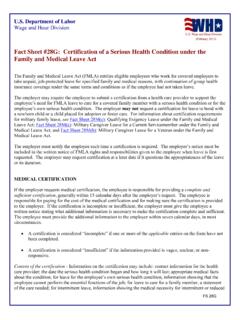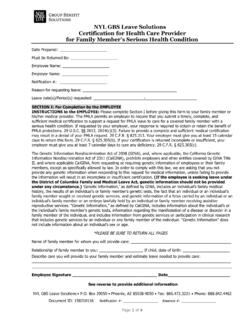Transcription of Boise State School of Social Work SAMPLE Advanced MSW ...
1 Rev: October 2017 Boise State School of Social Work SAMPLE Advanced MSW Learning Agreement Student Semester Year Faculty Field Liaison Agency Agency Field Instructor Agency Task Supervisor (if applicable) This learning agreement serves to articulate activities that support CSWE s competencies, School and student s learning objectives and to be a reflection of the student s year in the field. These activities are site-specific, measurable, and individualized with the goal of promoting the student s successful development of professional competencies. This plan is negotiated between the student, Agency Field Instructor, and Agency Task Supervisor (if applicable), and provides the basis for evaluating the student s professional development.
2 The student s plan should be comprehensive, with activities added as the year progresses, such that by the end of the year it reflects all the student s activities. Faculty Field Liaison consultation is available as needed to support the development of this plan. This plan should be completed no later than the 3rd week after the student internship begins. At the beginning of the second semester, the plan is updated to reflect changes and/or new opportunities. Rev: October 2017 1. Demonstrate Ethical and Professional Behavior a) Continually employ and model conscious use of self; self-reflection, self-monitoring, and self-correction in practice situations. b) Adhere to and model professional roles and boundaries. c) Demonstrate the ability to know when to seek out supervision.
3 D) Demonstrate leadership in applying ethical reasoning in Social work practice. e) Understand one s role as a life-long learner in the area of diversity and culture. f) Utilize ethical decision-making models to resolve ethical dilemmas. g) Understand the ethical implications of emerging technologies and their use in professional practice. h) Maintain accurate and timely professional documentation. i) Demonstrate effective oral and written communication. Learning Activities (include at least 2) 1) Keep notes on own behavior and thoughts during (or after) client meeting. Reflect on how personal assumptions impact professional conduct and interactions with clients. 2) Keep reflective journal/log of professional development and challenges; discuss in supervision. Discuss needed areas of growth in supervision and work on strategies toward growth.
4 3) Review the job description and/or performance standards for Social workers at your agency. Discuss these standards/expectations with your Field Instructor and strive to fulfill them. 4) Follow agency dress-code, e-mail and Social networking site rules, and professional expectations. 5) Attend and contribute to interdisciplinary team meetings / conferences. 6) Join a professional Social work organization (NASW, ISCSW or OSSW, for example) to gain familiarity with various Social workers and Social work roles in the community. 7) Utilize journal of self-reflection to develop possible alternatives to current practices within the agency, potential outcome expectations, and discuss the same with Agency Field Instructor, Faculty Field Liaison, or with peers in seminar courses.
5 8) Discuss and integrate ideas surrounding cultural diversity, and manage client access of resources in a manner that is thoughtful to their individual strengths, values and beliefs. 9) Observe, participate in, and perform assessments in the role of Social worker. Request assistance and feedback from supervisor on a consistent basis. 10) Present to weekly supervision meetings prepared (Bring a list of topics/cases to discuss, report back on learning activities, share reflections from week, etc.). 11) Document client strengths in case-notes and discuss strengths with both client(s) and supervisor. 12) Illustrate effective communication, either in chart notes, email professional memorandum, letters, and other written correspondence, as well as verbally and non-verbally. 13)Discuss NASW Code of Ethics with supervisor and discuss the role of ethics in the clinic s model of service.
6 14) Read agency policy on client confidentiality, discuss with supervisor, and maintain client confidentiality throughout field experience. Rev: October 2017 15) Discuss ethical behaviors and application of NASW Code of Ethics within the agency with Agency Field Instructor, Faculty Field Instructor, and/or peers during practicum seminar. 16) Review and discuss additional ethical or governing policies which may impact the way in which the agency is able to provide services to its clientele ( agency rules, Idaho Code, IDAPA Rules, HIPPA, FERPA, FMLA, SSI, AHCA, etc.). 17) Compare the NASW Code of Ethics with your agency s employee code of conduct and/or other policies. Discuss differences with Agency Field Instructor. 18) Discuss ethical concerns using an ethical decision-making model as part of supervisory meetings.
7 2. Engage Diversity and Difference in Practice a) Transform one s behavior in response to a recognition of one s biases based in difference and culture. b) Apply knowledge and interventions in ways that meet the needs of oppressed and marginalized client groups. c) Consider, explore, and evaluate diverse life experiences of client groups and apply to micro, mezzo, macro practice. d) Establish a relationally based process that encourages clients to be equal partners in the treatment planning process while setting aside personal bias. e) Recognize how Social context and structural barriers impact Social work practice with diverse and vulnerable populations. Learning Activities (include at least 2) 1) Utilize journaling, or some other method of reflection, to record personal beliefs, or values, regarding clients/staff who may be different than me (age, gender, race, religious affiliation, orientation, color, cultural background, marital status, family structure, class, physical ability, etc.
8 , and how my beliefs/values impact my interaction with various clients. Discuss the same with Agency Field Instructor, Faculty Field Liaison, and/or during practicum seminar class, giving special attention to issues that may seem particularly difficult or confusing. 2) During supervision, identify and reflect on personal values and perceptions about culture and class that influence Social work practice. 3) Treat all clients with respect and courtesy regardless of personal bias, and establish initial goals with the client/patient to ensure self-determination, as well as equal and just treatment to all clients/patients of the agency. 4) Review and discuss NASW s Cultural competency standards with your Field Instructor. Rev: October 2017 Work to incorporate these expectations/practice behaviors into your Social work practice.
9 5) Become aware of and make referrals to community agencies that reflect the values and cultural beliefs of client / family. 6) Use interpreters when interviewing and working with people from diverse cultures when English is not their primary language. 7) Use assessments that include sections of diversity/culture/spirituality as identified by client. 8) Identify client differences using a strengths perspective. 9) Discuss cultural structure and values and their effect(s) on different clients with supervisor. 10) Complete readings on cultural competence in clinical communication. Discuss with Field Instructor strategies for implementing these strategies into practice with clients. 3. Advance Human Rights and Social , Economic, and Environmental Justice a) Advocate for client systems in a way that addresses barriers and works for equitable distribution of resources and services.
10 B) Demonstrate necessary knowledge and skills to change Social institutions to be more humane and responsive. c) Work collaboratively with others to affect systemic change. d) Demonstrate understanding of global context of human rights violations and the Social , economic, environmental injustice and its impact on client groups. Learning Activities (include at least 2) 1) Identify and review key concepts of Social empowerment strategies. Discuss these strategies with field instructor and practice with clients. 2) Develop professional contacts with members of advocacy organizations that serve my client population. 3) Identify and discuss with Agency Field Instructor, Faculty Field Liaison, or peers in practicum seminar, various theories about human behaviors as may be observed when working with clients (biological, Social , cultural, psychological, and/or spiritual).








